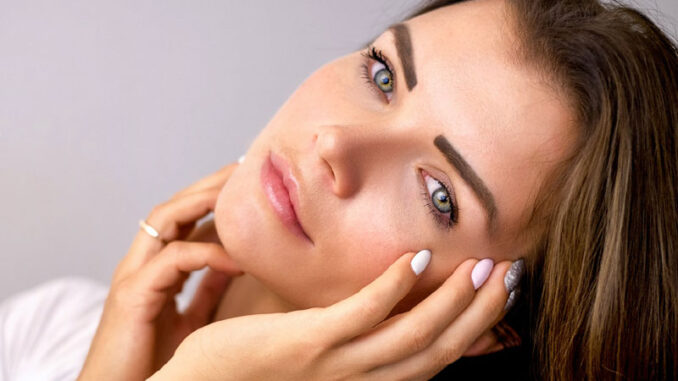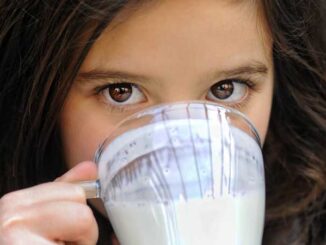
We already know a lot about the benefits of Kefir. Most medical specialists recommend drinking it every day to optimize the overall functioning of the gastrointestinal tract and improve our general health.
But what does all this have to do with our skin and our beauty, you’d ask?
Beyond the undoubtedly positive effects of Kefir when used internally (as a drink), we can also apply Kefir directly on the skin with even more convincing effects.
This is not only because the look and feel of our skin largely depend on our guts’ health but also because Kefir contains huge amounts of vitamins, minerals, and microelements that have direct nourishing, cleansing, and whitening, soothing, and moisturizing effects on our skin.
How does that all work?
The skin has its own microbiota
Humans and bacteria live in symbiosis, and the influence of microorganisms inhabiting the human body inside and out has been scientifically studied for a long time. This entire host of microorganisms that usually live in all of us in perfect balance is called microbiota.
Recently, scientists pay much attention to skin flora as a factor for the overall health and quality of the skin. The dermo-cosmetic products, based on probiotics, currently represent one of the most significant trends in the modern cosmetics industry.
The skin is the largest organ of the human body and its health directly reflects and is reflected by the general health of the body.
The skin is inhabited by trillions of microorganisms: bacteria, yeasts, fungi, viruses, collectively called “microbiota,” is what makes us unique. The total weight of our microbiota (all microorganisms that live in all of us) is equal to our brain’s weight – about 2 kg. The skin microbiota includes only microorganisms living on the skin surface, but both external (skin) and internal (guts) microbiota are mutually connected.
The health of our skin largely depends on what happens in our stomach and intestines! Many skin problems, such as acne, eczema, or dry skin, usually begin in our guts.
And here comes the myriad of advantages that Kefir can offer, either taken internally as a probiotic drink or applied externally – directly on our skin as a purely natural skincare product.
Skin benefits from the internal use of Kefir as a drink
Known for centuries, but still not popular enough in the Western world, Kefir is the most powerful natural probiotic product, containing a unique cocktail of beneficial bacteria and yeasts, some of which, such as Leuconostoc, Lactobacillus Caucasus, Torula kefir, and Saccharomyces kefir, cannot be found in yogurt.
The consumption of this fermented drink has a magical effect on the skin in nourishing and smoothing it.
Drinking Kefir can benefit a series of skin problems such as acne, rosacea, and atopic dermatitis. Kefir brings useful good bacteria and easts into the gastrointestinal tract that create a barrier to inflammatory processes, directly affecting our skin.
- Kefir removes toxins and allergens from the body and is indispensable after a course of antibiotics.
- Kefir also contains Tryptophan, which makes it a natural antidepressant that soothes and improves sleep, which always has a positive effect on the look and feel of our skin.
- Kefir contains several times more calcium than milk and is indispensable for children, older people, and lactating mothers.
- Kefir is also an indispensable part of many weight-loss diets.
- Finally, Kefir promotes longevity and rejuvenation thanks to the high number of antioxidants it contains.
It is no coincidence that people who use Kefir for longer periods are known to have the so-called “Kefir skin “, which translates into healthy, smooth, and young-looking skin.
A recently published study (of November 2021) suggested the existence of a “gut-skin axis”, consisting of a direct metabolic dependence between the microbiome of the intestine and cutaneous health.
The study found that the skin and intestine share a series of indirect metabolic pathways, and the disruption of the intestinal microbiota is linked to the development of a series of allergic or inflammatory skin diseases, such as atopic dermatitis (eczema), transepidermal water loss, rosacea, etc.
The results of this study demonstrated a significant improvement in all skin conditions and suggested that people affected by atopical dermatitis may seriously benefit from Kefir intake, especially regarding their skin hydration.
“The nutritional and microbial richness of Kefir makes its application highly relevant within many sectors of health care”, the study concluded.
Beyond the numerous probiotic bacteria and yeast, milk Kefir also contains a huge number of vitamins and microelements, only the main ones of which are the vitamins A, D, D₃, E, K, C, B₁, B₂, B₃, B₄, B₅, B₆, B₉, and B₁₂, as well as the elements zinc, molybdenum, fluorine, selenium, cobalt, calcium, iodine, manganese, sulfur, potassium, iron, copper, etc.
These vitamins and microelements internally contribute to moisturizing the skin, rejuvenating it, improving its complexion, and providing a series of valuable ingredients for its nutrition.
- Thanks to vitamin A and carotene, for instance, visual acuity increases, skin, hair, and nails improve, and the aging process of the epidermis slows down.
- Vitamin D increases the body’s ability to absorb calcium, which deficiency can cause brittle bones.
- Vitamin B2 speeds up all skin regeneration processes, and
- Vitamin B1 acts against inflammations and irritations.
- Finally, vitamin C allows the entire body to resist infections better.
Skin benefits from the external use of Kefir as a skincare product
Beyond the indisputably positive effects of Kefir when used internally, Kefir can also be applied externally, through direct skin applications, with even more positive outcomes.
Kefir is a versatile facial and general skin care product and is suitable for all skin types.
Kefir has a gentle whitening and natural healing effect. If you want to whiten your skin or tone down the color of your freckles a bit, Kefir will help. Just apply it to your face, and the result will soon be visible.
Kefir has an excellent cleansing effect. It cleans and tightens pores, and lactic acid is also known to moisturize the skin deeply. Kefir perfectly cleanses the skin and eliminates excess fat. That is why it is often used as a simple and natural cosmetic product by people with oily skin. You can use Kefir as a natural cleanser, applying it directly to the skin with a cotton swab. This procedure does not take time but always has an excellent effect.
Kefir components establish an optimal balance of alkali and acids in cells. Thanks to this, the epidermis is naturally cleansed from fats and impurities, and the skin is protected from early aging.
Kefir also has a powerful anti-inflammatory effect, which is indispensable in the fight against acne and various other skin inflammations.
As a powerful probiotic Kefir can be directly applied to virtually any type of skin, but you need to take into account Kefir’s acidity.
The acidity of Kefir depends on the duration of its fermentation. The longer the fermentation lasts, the higher its acidity level usually is. The higher the acidity level of Kefir is, the more irritating it could be on dry or sensitive skins.
So, for dry or sensitive skin, fresh Kefir with no more than 1 day of fermentation (low acidity) is better, while for oily skin, Kefir having fermented 2 or more days (higher acidity) could be a better option.
Note, however, that longer fermentation (meaning higher acidity) also relates to higher probiotic and healing powers of Kefir. It is therefore essential to find the right balance between the accentuated positive effects of the highly fermented (and acidic) Kefir, and the potential risks of additional skin irritation due to this increased acidity.

Simple receipts for Kefir skincare lotions and face masks
Without any additives or alterations, we can safely use Kefir for everyday morning wipings of the face, neck, and décolleté.
Just take a regular cotton pad, dip it in a slightly warm fresh Kefir, and apply it to your skin. Wait for 3 to 5 minutes or leave to dry completely. Then rinse with water or using your usual cleanser.
This morning procedure will refresh and cleanse your face, tighten its contour, and give it a beautiful silky color and a healthy blush.
We will give you here some effortless and straightforward recipes for Kefir-based masks and lotions for your skin.
Kefir mask for oily skin
- Half a tablespoon of Kefir
- 2 drops of lemon juice
- 10 drops of vegetable oil
- A pinch of salt
- 1½ tablespoon of oat flour
Combine and mix well all the ingredients so that the mask gets thick. If the mask is too runny, add a little more flour. Apply the mask to the cleansed skin and wait for 15-20 minutes. Rinse off the mask with warm water.
Kefir mask for dry skin
- 2 tablespoons of Kefir
- 1 egg yolk
- 1 teaspoon of olive oil
Pour all ingredients into a bowl and mix well. Apply the mask to cleansed face for 15-20 minutes, then rinse with water and dry with a soft towel or cotton swab. Olive oil and egg yolk will help dry skin regain its natural freshness.
Kefir moisturizing face mask
- 1 tablespoon of Kefir
- 1 tablespoon honey
- The pulp of half a ripe avocado
Mash the avocado pulp with a fork, then add honey and mix well. Add Kefir and stir again.
Apply the mask to the cleansed skin, leave it on for 15-20 minutes, then rinse with warm water. The results will be visible almost immediately! Avocados contain valuable fats that are great for moisturizing the skin.
Kefir face mask with oatmeal
- 2 tablespoons of Kefir
- 1 tablespoon of oatmeal
Mix the ingredients well and apply the mixture to the face. Wait for 15 minutes, then rinse with water at room temperature. This mask will give the skin a matte finish, eliminating any excess shine.
Kefir nourishing face mask
- 3 tablespoons of Kefir
- 1 tablespoon crushed tea leaves
- ½ teaspoon of olive oil
- 1½ teaspoons of oat flour
Stir the Kefir, tea leaves, and olive oil well. Finally, add the oatmeal and stir well again. Apply the mask to your face, leave it on for 20 minutes, and rinse with warm water.
Kefir hand lotion
- 1 tablespoon of almond oil
- 1 cup of Kefir
Mix almond oil and Kefir, and stir well. Apply to hands at bedtime and wait for the mask to get absorbed by the skin. Wear cotton gloves overnight. Apply this mask once a week.
Kefir hair conditioner
- ½ cup of Kefir
- 1 egg yolk, beaten
- 2 teaspoons of minced lemon peel
- ½ teaspoon of seaweed powder
Mix all the ingredients well, apply to the scalp, massage and leave for half an hour. Rinse off the mask with warm water and wash your hair with regular shampoo.



